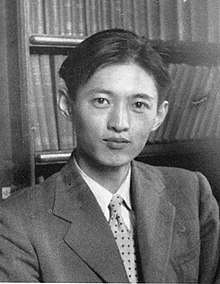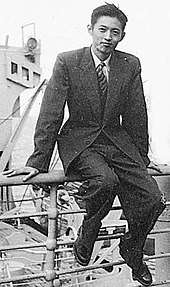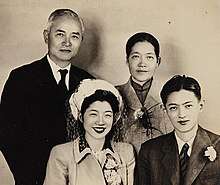Chen-Lu Tsou
| Chen-Lu Tsou | |||||||||
|---|---|---|---|---|---|---|---|---|---|
 Tsou in the 1940s | |||||||||
| Native name | 邹承鲁 (Zou Chenglu) | ||||||||
| Born |
17 May 1923 Qingdao, Shandong, China | ||||||||
| Died |
23 November 2006 (aged 83) Beijing, China | ||||||||
| Alma mater |
National Southwestern Associated University University of Cambridge | ||||||||
| Known for | Tsou's equation, Tsou's plot | ||||||||
| Spouse(s) | |||||||||
| Awards |
TWAS Prize (1992), National Natural Science Prize (First Class three times and Second Class three times) | ||||||||
| Scientific career | |||||||||
| Fields | Biochemistry | ||||||||
| Institutions |
Shanghai Institute of Biochemistry, Institute of Biophysics, Chinese Academy of Sciences | ||||||||
| Doctoral advisor | David Keilin | ||||||||
| Chinese name | |||||||||
| Traditional Chinese | 鄒承魯 | ||||||||
| Simplified Chinese | 邹承鲁 | ||||||||
| |||||||||
Zou Chenglu (Chinese: 邹承鲁; 17 May 1923 – 23 November 2006), better known in English as Chen-Lu Tsou, was a Chinese biochemist. He was a professor of the Shanghai Institute of Biochemistry and later a professor and Deputy Director of the Institute of Biophysics, Chinese Academy of Sciences (CAS). Tsou was an academician of the CAS and The World Academy of Sciences (TWAS). He made important contributions to the synthesis of insulin, and won the TWAS Prize in Biology in 1992 for his pioneering study of enzyme inhibition kinetics. He was awarded the National Natural Science Prize First Class three times. His wife, physicist Li Lin, was also a CAS academician.
Early life and education

Tsou was born on 17 May 1923 in Qingdao, Shandong Province, with his ancestral home in Wuxi, Jiangsu.[1] During the Second Sino-Japanese War, he sought refuge in Kunming in China's interior and studied chemistry at the National Southwestern Associated University. After graduation in 1945, he briefly served in the army before the end of World War II.[2]
After the war, Tsou won a government scholarship to study in England. He was at first bound for the University of Birmingham, but on the recommendation of Wang Yinglai, he was accepted by the University of Cambridge to study under David Keilin,[3] who had been Wang's doctoral advisor, at the Molteno Institute for Research in Parasitology. His wife Li Lin (Anna) was a Ph.D. student in Cambridge's Department of Metallurgy.[3]
Career
Tsou's doctoral thesis was properties of the haemprotein cytochrome c; his research is considered a first step towards the eventual discovery of protein's structure.[3] After he and his wife both acquired their Ph.D. degrees in 1951, they returned to the newly established People's Republic of China and Tsou became a researcher at the Shanghai Institute of Physiology and Biochemistry where Wang Yinglai served as a deputy director.[3]
After 1958, Tsou was a member of the team at the Shanghai Institute of Biochemistry that first achieved the total chemical synthesis of insulin in 1965. His major contribution to the project was to form the disulphate bridges by joining two synthetic polypeptides using oxidation.[3][4] His method for calculating the chemical modification of proteins is known as Tsou's equation. In 1981, he was awarded the National Natural Science Prize, First Class, for this achievement.[4]
In 1970, Tsou moved to Beijing to help look after his ailing father-in-law Li Siguang,[3][5] and transferred to the Institute of Biophysics, Chinese Academy of Sciences.[1] It was in the midst of the Cultural Revolution, when scientific activity was frozen in the anti-intellectual political atmosphere. When American biochemist Emil L. Smith, a fellow alumnus of the Molteno Institute, visited Tsou following Richard Nixon's 1972 visit to China, Tsou used reagent bottles filled with water to maintain a pretense of scientific research.[3]
After the end of the Cultural Revolution, Tsou was able to resume his research and was elected as an academician of the Chinese Academy of Sciences in 1980.[3] He pioneered the study of enzyme inhibition kinetics, for which he was awarded the TWAS Prize in Biology in 1992.[4][6] Despite losing an entire decade of his prime, he published at least 118 papers, mostly in international journals.[3] In 1990, his autobiography was published in Comprehensive Biochemistry Volume 27.[2][4] He won the National Natural Science Prize First Class three times and Second Class three times.[1]
Campaign against "unhealthy practices" in science
Tsou was a strong advocate against academic fraud and pseudoscience, and led a public campaign against what he called "unhealthy practices" such as administrators' interference in scientific research.[1][3][7] At the Institute of Biophysics, Tsou raised objections to Director Bei Shizhang's display of his achievement in cell formation. The criticism poisoned his relationship with Bei, making Tsou feel "uneasy" at the institute. Scientist Rao Yi later raised the same objections and praised Tsou's probity.[8]
Family

Tsou married Li Lin (Anna Tsou), a fellow Chinese student at Cambridge, in 1948. Li was the daughter of the famous geologist and academician Li Siguang, who was in England to preside over their wedding, and she would become a prominent physicist. Tsou later recalled the Cambridge years as the best time for his family.[5] Their daughter, geologist Zou Zongping (邹宗平),[9] was born in the 1950s in China.[3] Li Lin was also elected as an academician of the CAS, making the Li-Tsou family the only one in China that produced three academicians (including Li Siguang).[5]
Death
Tsou suffered from cancer in old age, but continued working until the last day of his life. He died in Beijing on 23 November 2006, at the age of 83.[3]
References
- 1 2 3 4 20世纪中国学术大典: 生物学 [Encyclopedia of 20th-Century Chinese Scholarship: Biology] (in Chinese). Fujian Education Press. 2004. pp. 560–1. ISBN 978-7-5334-3646-9.
- 1 2 Tsou, Chen-Lu (1 January 1990). 'The Highest Grade of this Clarifying Activity has no Limit' – Confucius. Comprehensive Biochemistry. 37. pp. 349–386. doi:10.1016/B978-0-444-81216-2.50017-2. ISBN 9780444812162. ISSN 0069-8032.
- 1 2 3 4 5 6 7 8 9 10 11 12 Slater, E. C. (March 2007). "Memories of Chen-lu Tsou". IUBMB Life. 59 (3): 190–192. doi:10.1080/15216540701210208. ISSN 1521-6543. PMID 17487691.
- 1 2 3 4 "Zou Chenglu". Ho Leung Ho Lee Foundation. Retrieved 26 June 2018.
- 1 2 3 "邹承鲁:忆恩师·回国". People's Daily. 24 November 2006. Retrieved 28 June 2018.
- ↑ "Recipients of TWAS Awards and Prizes". TWAS. Retrieved 2018-09-27.
- ↑ Wang, Chih-chen; Wang, Zhi-Xin; Zhang, Baoyuan; Li, Ming (June 2011). "Dr. Chen-lu Tsou: a tireless advocate for advancement in the standards of scientific research in China". Protein & Cell. 2 (6): 435–436. doi:10.1007/s13238-011-1067-5. ISSN 1674-800X. PMC 4875182. PMID 21748592.
- ↑ Christine Yi Lai Luk (2015). A History of Biophysics in Contemporary China. Springer. pp. 28–29. ISBN 978-3-319-18093-9.
- ↑ Jin, Yu (4 December 2006). "邹承鲁:一生做真人". Sina. Retrieved 28 June 2018.